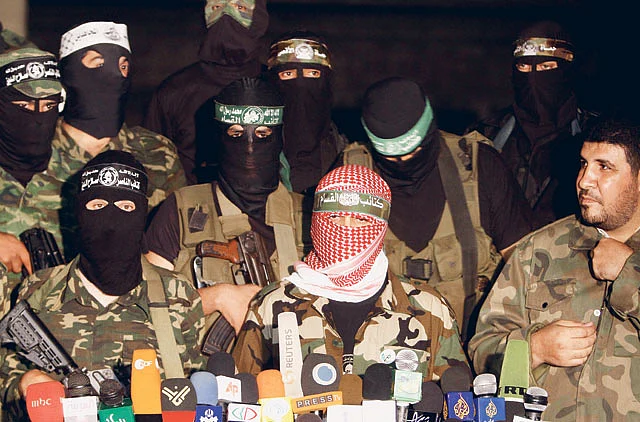Gaza City: To relaunch Middle East peace talks on Thursday, the Israeli and Palestinian leaders and their American mediators quietly agreed to push aside the question of Hamas — the group that controls one of the two Palestinian territories and rejects negotiations.
But Hamas let it be known with its bullets that it would not be left out of the equation — the fighters killed four Israelis and wounded two others in a pair of attacks on the eve of the new talks.
The bloodshed was a reminder that Hamas is now on the list of intractable issues that have stymied decades of Middle East negotiations. There can be no peace without Hamas, but there is no solution so far for bringing it into the process.
"The attacks were meant to tell [Palestinian President Mahmoud] Abbas he is not the one who decides the fate of the Palestinians," declared Ahmad Yousuf, a senior Hamas official in Gaza, adding that the group deserves a place in national decision-making because it won parliamentary elections in 2006.
"Hamas will never agree to be ignored and isolated, and it can reshuffle the cards," he said.
Hamas is firmly in control of the Gaza Strip, one of the two territories that are supposed to be part of a future Palestinian state. It wields virtual veto power over any agreement and has given no indication it would be willing to accept a deal with Israel reached by Abbas, who runs a rival government in the West Bank.
The more moderate Abbas met Israeli Prime Minister Benjamin Netanyahu on Thursday for the first peace talks in two years, hosted by President Barack Obama.
Abbas and Netanyahu are far apart on issues that have eluded a solution for decades, including the borders of a Palestinian state, the fate of millions of Palestinian refugees and the most explosive issue, the competing claims to the occupied Jerusalem.
But if they can somehow work out these differences, Hamas would be needed to implement any deal. The Palestinians seek the West Bank and Gaza — located on opposite sides of Israel — for their future state, with east Jerusalem as its capital.
Unified
For now, the Palestinians appear to be unified on one issue: There can be no peace that leaves the 1.5 million people of Gaza out.
Abbas has rejected any suggestion of a partial solution granting independence only to the West Bank and its 2.4 million Palestinians. This would be perceived by the Palestinian public as a massive sellout and sign of weakness. Hamas would paint Abbas as a traitor.
"Any result and outcome of these talks does not commit us and does not commit our people. It only commits Abbas himself," said Sami Abu Zuhri, a Hamas spokesman in Gaza.
Abbas has repeatedly said he will present any peace deal to a national referendum, a vote that would include the people of Gaza. A vote in favour of peace would put heavy pressure on Hamas to accept the will of the Palestinian people.
So if Abbas will not go it alone, the quandary is how to bring Hamas into the fold. Hamas, founded two decades ago as a Palestinian offshoot of Egypt's Muslim Brotherhood, has repeatedly played the role of spoiler in Mideast peace efforts over the years.
A series of Hamas suicide bombings in the mid-1990s helped derail peace negotiations at the time. The group also killed hundreds of Israelis during the second Palestinian uprising last decade — a time of heavy fighting in which Israel killed Hamas' spiritual leader and dozens of other top commanders. Hundreds of Palestinian civilians also died in the fighting.
Fiery speeches
When Israel unilaterally withdrew from Gaza in 2005, Hamas stepped up rocket attacks on southern Israel, helping fuel years of violence. After the 2006 election, a unity government formed with Abbas' Fatah movement collapsed into civil war, resulting in Hamas' takeover of Gaza the following year.
In fiery speeches ahead of the launch of peace talks, Hamas leaders repeatedly rejected compromise with Israel and condemned Abbas for seeking peace.
Yet behind the public rhetoric, the enigmatic group has also shown itself to be remarkably pragmatic. In its short-lived power-sharing agreement with Abbas, it agreed to let the moderate president handle negotiations with Israel, as long as he presented any deal to a national referendum.
While refusing to recognise the Jewish state's right to exist, Hamas has largely honoured a ceasefire since a devastating Israeli military offensive ended early last year.
Hamas forces have even blocked smaller groups from staging attacks, and last week, commanders ordered their forces to hold fire when Israeli tanks were conducting exercises along the Gaza border.
Sign up for the Daily Briefing
Get the latest news and updates straight to your inbox
Network Links
GN StoreDownload our app
© Al Nisr Publishing LLC 2026. All rights reserved.
